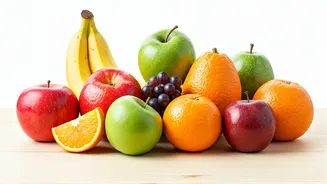Apples: The Classic Choice
Apples, a universally loved fruit, are packed with antioxidants like quercetin, which are vital for protecting brain cells from damage. These antioxidants combat
free radicals, helping to maintain optimal brain function. Moreover, the fiber in apples aids digestion, ensuring that nutrients are efficiently absorbed. Regularly eating apples can improve memory and learning capabilities in children. Introduce apples in various ways, such as sliced, in smoothies, or baked into healthy treats. It’s a simple addition that can yield significant benefits for your child's cognitive health and overall well-being.
Berries: Brain Powerhouses
Berries, including blueberries, strawberries, and raspberries, are among the best fruits for brain health, thanks to their high concentration of antioxidants and flavonoids. These components improve communication between brain cells, enhancing memory and concentration. Blueberries, in particular, have been linked to improved learning abilities and the prevention of age-related cognitive decline. Strawberries are rich in vitamin C, essential for brain cell health. Incorporate berries into your child's diet by adding them to breakfast cereal, mixing them into yogurt, or serving them as a standalone snack. Their vibrant colors and sweet flavors make them an easy sell for even the pickiest eaters, providing a delicious and nutritious boost.
Bananas: Energy and Focus
Bananas offer a unique combination of nutrients that support brain function and overall energy levels. Rich in potassium, bananas help maintain healthy blood flow to the brain, while vitamin B6 contributes to the production of neurotransmitters that improve mood and focus. The natural sugars in bananas provide sustained energy, keeping children alert and focused throughout the day. Bananas are convenient and easy to eat, making them a perfect snack for school or during playtime. Whether eaten alone, mashed, or blended into a smoothie, bananas are a versatile fruit that can boost both physical energy and cognitive performance.
Oranges: Vitamin C Boost
Oranges, well-known for their high vitamin C content, play a significant role in brain health. Vitamin C is a powerful antioxidant that protects the brain from oxidative stress and supports the production of neurotransmitters, which are essential for cognitive function. Oranges also provide folate, a B vitamin crucial for brain development, particularly in children. Consuming oranges or drinking fresh orange juice can enhance cognitive abilities and protect the brain from damage. Integrate oranges into your child's diet by offering them as a refreshing snack, adding them to salads, or incorporating them into fruit salads for a vitamin-packed boost.
Grapes: Antioxidant Rich
Grapes are packed with antioxidants, including resveratrol, which is known for its protective effects on the brain. Resveratrol improves blood flow to the brain and reduces inflammation, promoting overall brain health. Additionally, grapes contain beneficial phytonutrients that support cognitive function and memory. Offering grapes as a snack can provide children with a healthy dose of antioxidants, helping to protect their brain cells from damage. Serve grapes as part of a balanced meal or a quick, refreshing snack to keep children engaged and focused. They are a naturally sweet treat with significant health advantages.
Avocados: Healthy Fats
While often considered a vegetable, avocados are actually a fruit rich in healthy monounsaturated fats. These fats are essential for brain development and function, providing the building blocks for brain cells and supporting the absorption of fat-soluble vitamins. Avocados also improve blood flow to the brain, enhancing cognitive performance and focus. Introduce avocados to your child’s diet through mashed avocado on toast, added to smoothies, or incorporated into salads. They provide sustained energy and support healthy brain function, making them a valuable addition to any child’s diet.
Kiwi: Vitamin K & C
Kiwis are a nutritional powerhouse, brimming with vitamin C and vitamin K, both vital for brain health and overall growth. Vitamin C is a powerful antioxidant that shields the brain from damage, while vitamin K is essential for blood clotting and contributes to cognitive function. Kiwis also contain folate, which is crucial for brain development. Including kiwis in your child’s diet helps improve brain function and supports their immune system. Serve kiwis as a snack, add them to smoothies, or use them in fruit salads to offer a refreshing and nutritious option.
Mangoes: Vitamin-Rich Delight
Mangoes, with their vibrant color and sweet taste, are packed with vitamins and antioxidants that contribute to brain health and overall well-being. Rich in vitamin A, mangoes support eye health, which is vital for learning and visual processing. They also contain vitamin C, which acts as a powerful antioxidant, protecting the brain from damage. The fiber in mangoes helps with digestion, allowing better absorption of nutrients. Incorporate mangoes into your child’s diet by including them in smoothies, fruit salads, or as a standalone snack. Their delicious taste and nutritional benefits make mangoes a winning choice.
Pears: Fiber & Focus
Pears provide a blend of nutrients that support brain function, including fiber, which aids in stable blood sugar levels. Stable blood sugar is critical for maintaining focus and concentration throughout the day. Pears also contain antioxidants that protect brain cells from damage. Their gentle sweetness and smooth texture make them a great fruit to introduce to children. Serve pears sliced, in smoothies, or as part of a balanced meal to promote cognitive health and overall well-being. Regular consumption of pears can aid in both physical health and improved cognitive performance.
Watermelon: Hydration and More
Watermelon is an excellent fruit, particularly during warm weather, for its high water content and various nutrients that benefit brain function. Proper hydration is essential for brain health, and watermelon helps to keep children hydrated. It also contains antioxidants like lycopene, which protects brain cells from damage. Watermelon’s light, refreshing taste and high water content make it a perfect snack. Offer watermelon slices, blend it into smoothies, or add it to fruit salads. Including watermelon in your child’s diet supports hydration, provides essential nutrients, and contributes to overall brain health, ensuring they stay focused and energized.
























